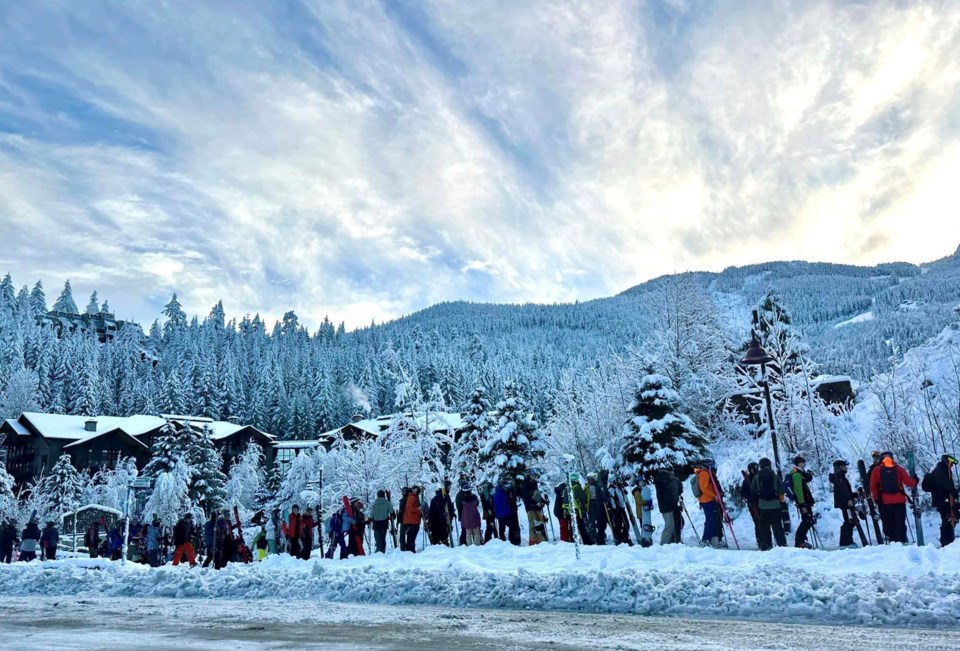Poor winter conditions are done with—at least on the surface—for the Whistler community.
After months of warmer-than-average temperatures and low precipitation, Whistler now has the snowpack… of three months ago.
“If you look at our snowpack in the alpine right now, it is what we would typically have in late October,” said Whistler Search and Rescue (WSAR) president, Brad Sills.
“So we’re still a long way from having coverage.”
The latest Snow Survey and Water Supply Bulletin from the Ministry of Water, Land and Resource Stewardship showed that, across B.C., snowpack is “extremely low” and averaging at 56 per cent of normal for the province. In the South Coast region, the bulletin reported snowpack was only 36 per cent of normal. At the same time last year, snowpack was 70 per cent of normal in this region.
For recreation, early season snow serves the purpose of filling in gaps in the environment and hiding obstacles, with later season snow over the top providing that popular pow everyone visits the region for. But right now, the heavy snowfall of the last few days is only beginning to undo a very slow start to the season, and recreationalists heading into the hills need to be careful.
“There’s a lot of rocks, and logs and creek beds and all sorts of hazards out there right now,” said Sills.
Given the late start to the season, WSAR has seen a very slow start to calls for assistance, with the last major incident being the disappearance of Robert McKean in October.
With no snow, calls the WSAR would usually expect this time of year never came.
“We had slowed right down through November and December, I think they were probably the quietest we’ve ever had on record—not surprising, considering the weather,” said Sills.
That changed last week when a pair of snowfall warnings brought the goods to Whistler and the entire Sea to Sky corridor.
“On Friday, Saturday and Sunday this week, as soon as the snow came, we were out every day—which again is not surprising because of the pent-up demand of people that are just burning to get out there,” Sills said.
On Thursday, Jan. 11, WSAR, with assistance from North Shore Rescue, rescued two skiers stuck in Fitzsimmons Creek.
So far, WSAR has responded to two other incidents that required action this year—some hikers were camping, and were surprised by the snow they woke to on Friday, Jan. 5, and another group was enjoying the recent snowfall on Saturday, Jan. 6 in an area they were unfamiliar with and got lost.
Both calls were resolved safely.
Safety remains top-of-mind for responders both off and on the mountain. Adam Mercer, senior manager of patrol with Whistler Blackcomb, started out the season back in late November warning of the lack of early snowfall making ski conditions a relative unknown so early in the season. More than 100 cm worth of snow on the hill later, Mercer reiterated the same warning.
“We’d like to emphasize that snow levels remain lower than average in the high alpine,” he told Pique.
“Even though there is new snow and the alpine is open, there are still concerns about natural hazards including rocks, crevasses, and other features that haven’t been covered yet. Guests should stick to groomed and open trails within their ability levels and only leave the boundary if equipped; and have the proper training, knowledge and equipment.”
He reported the patrol team has been busy so far, “especially after recent significant snow events. There have been calls and incidents, including the recent in-bounds avalanche reported a few days ago. During this time, avalanche mitigation work, boundary maintenance, signage, and guest management are top priorities.”
Mercer said while the recent snowfall is a positive sign, more is needed before the resort can report normal depths.
“Guests are encouraged to report any incidents promptly to our patrol team. Additionally, we want to remind everyone of the ongoing hazards associated with snow immersion and tree wells.
“Please be advised that there is strictly no uphill travel allowed outside of designated uphill routes. Engaging in uphill travel outside these designated areas is a violation that will result in the loss of pass privileges.”
The seven-day forecast as of writing is for cooler temperatures to remain well into the next week with flurries, with some major snowfall forecast to return by Tuesday, Jan. 16.
If you’re going to head into the hills, find more information on how to stay safe in the backcountry by heading to adventuresmart.ca, a BC Search and Rescue Association tool designed to educate backcountry users and recreationalists on best practices to ensure they come home safe.




